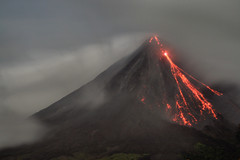
Arenal
Originally uploaded by Clearly Ambiguous.
The 20th Century poet René Char made no secret of his admiration for his long-dead 19th Century predecessor, the young French poetic genius Arthur Rimbaud who completed his entire oeuvre before the age of twenty-one, then left France on a series of adventurous engagements in far-flung parts of the world, travelling as far as Java in the pay of the Dutch Colonial Army and working as a merchant in Ethiopia.
Char admired Rimbaud's decision to leave Paris. In his poem: "Tu as bien fait de partir, Arthur Rimbaud. (You did well to leave, Arthur Rimbaud)", he writes of Rimbaud the outsider, Rimbaud who "abandoned the streets of idlers, the taverns of lyric-pissers." He asks: "Si les volcans changent peu de place, leur lave parcourt le grand vide du monde et lui apporte des vertus qui chantent dans ses plaies. (If volcanos barely move, their lava travels the great emptiness of the world and bring to it the virtues that sing in its wounds.)"
In this metaphor, we see Rimbaud going out into the world as a stream of lava, bursting from a volcano, scorching the ground over which it travels. There is the sense of the departing lava creating a wound in the volcano, but also the idea of these wounds being worthwhile, becoming virtuous as the poems left behind in them begin to sing. The volcano is at once the city of Paris, but also the sum of French culture at the time: something static, that barely stirs.
In another poem, Char addresses a different voyaging hero Antonin Artaud as follows: "Je n'ai pas de voix pour faire ton éloge, grand frère. (I don't have the voice to praise you, great brother." The poem seems to have an elegaic theme, but at the same time revolts at such a concept as elegy and, speaking of Artaud, states: "Pour nous, rien n'est changé, / Rien, sinon cette chimère bien en vie de l'enfer qui prend congé de notre angoisse. (For us, nothing has changed, / Nothing, if not this lusty chimera out of hell which from our anguish takes its leave.)"
Earlier in the poem, Char speaks of "a heart shared by us" that "kills, goes hollow and burns, / Then is reborn in the softness of the mushroom" and of "lightly chopping down a forest / With our entrails for an axe". As in the earlier poem to Rimbaud, there is a creative confusion between inner and outer spaces, the poet a phoenix-like force capable of devastating the physical world, but containing the idea that this devastation is really internal, and associated with the poet's own demise, the spilling of his own entrails.
Then Char commands Artaud to return to the same place from whence Rimbaud emerged: "Il suffit. Rentre au volcan. (It suffices. Go back into the volcano.)" In so doing, he writes a kind of formula for his ideal poetic character: eruptive, wounding and feverish.
The title of Char's most famous book "Fureur et mystère (Fury and Mystery)" might even have been made to describe volcanos which are always a source of fear for those who live near them and of mystery for those who try to understand them. And might not these features be also what Char admired in his "great brothers"?
No comments:
Post a Comment